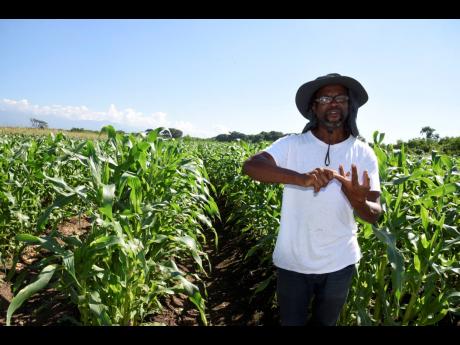Bernard Lodge lands produced world-class onions, says farmer - Veteran rues future construction of township at location
Veteran farmer Paul Henry is well aware of the potential of the 26-acre parcel of land he will be forced to give up when the Sugar Company of Jamaica (SCJ) Holdings Limited takes control of the property on the former Bernard Lodge Sugar Estates in St Catherine.
He has already been forced to scale down operations to a measly two acres on which he has a crop of sweet corns in light of his pending relocation to land yet to be identified and prepared for his occupation by the SCJ.
With almost 90 per cent of the farmers who were being evicted to make way for the establishment of a new township already relocated, Henry is among a small number given permission to cultivate plots by the original lessees. He questioned the State’s rationale for opting to put houses on such prime agricultural land.
“This is the old Agro-21 land with the best alluvial soil in Jamaica. It probably shouldn’t be touched to do housing and should remain in farming. We did onions, and the result was at world standard – between 25,000-30,000 pounds to the acre. Everything does well out here,” he told The Gleaner on Tuesday.
“They (SCJ) say they going to give us back some land. My biggest concern is you taking me off the land before you prepared where you sending me to. I would like to take up my pipes and everything and just go put them down over there. I don’t want to stop my business for how long I don’t know and then have to get started again,” he said. “I am going to lose a lot of my irrigation pipes due to the fact that we have to keep ploughing the place so we drop pipes all two feet underground and we can’t retrieve them.”
SUFFERED GREAT LOSS
Henry, who is among contract farmers supplying the Caribbean Broilers (CB) Group Imagination Farm at Hill Run in the parish, said he suffered losses in the region of $1.8 million recently when the corn seeds supplied to farmers recently proved to be bad. He said that farmers in St Ann, Manchester, and Clarendon were also affected.
As part of its investment in helping Jamaica to achieve food security and nutrition, CB had sent Henry on an onion study tour in the Dominican Republic, which vastly expanded his farming knowledge.
“We used about 22 million pounds of onion before this, so we are using about 1.8 million pounds of onions per month, and the onion bill is about J$600 million. Sometimes I wonder if the powers who import these things really want us to solve that and save the money. Me really wonder,” he said.
Henry’s argument is predicated on his and the claim of other farmers that the land on which they are being relocated such as at Salt Pond in the parish is more of a Sydenham clay, very impervious and better suited to fish farming.
“This is the best alluvial soil because this soil is a sandy loam. So after all the recent rain, we were able to plough back immediately because it drains fast while the Sydenham clay is a tougher clay that you see down that side.”
This notwithstanding, CB Group Director Lori-Ann Lyn was able to successfully negotiate with the SCJ for a 300-acre block for some of the farmers contracted to Imagination Farm. As he awaits details of the deal, Henry is in the process of penning a letter to managing director of Sugar Company of Jamaica Holding Joseph Shoucair about getting some financial help in replacing the vast underground network of pipes and pumps, parts of which he claims have existed since the days of the Agro-21 venture, which was the brainchild of former Prime Minister Edward Seaga.
“The thing is we need back pressurised water. We can’t go back to the canal days because is not everything can take flood irrigation – pepper and onion cannot use that. Underground here is a serious network of pipes and a pump system, which to replace it now is gonna cost a nice penny,” he told The Gleaner.

